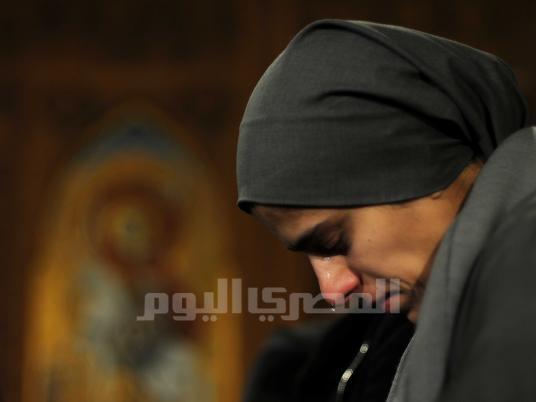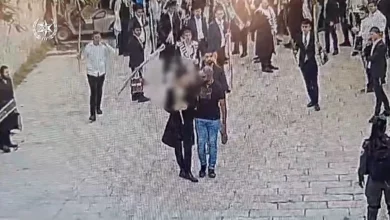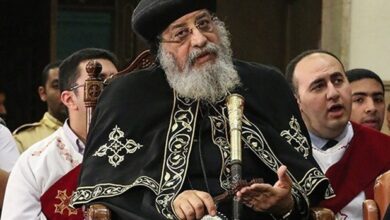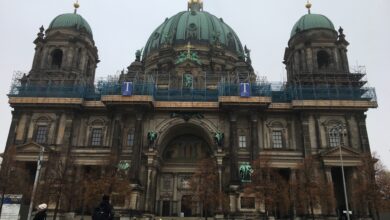
Copts, many would say, have been persistently subject to sectarianism at the hands both of the state, and society more broadly. But there are also persistently ways out, ways that frame the “Coptic question” less as a Coptic question at all, but rather a national one. Here we look at the state of play within the state, society and the church itself.
The state
Social media was awash with sarcastic jokes when Mohamed al-Sawy, a conservative member of the Constituent Assembly drafting the constitution, claimed that he represented the church, after it had withdrawn from the assembly. Like many other parties, the church withdrew when it saw that negotiations over the draft came to a deadlock.
Article 2 of the constitution stipulates that principles of Islamic Sharia are the main source of legislation, but what is less commented upon is that the proposed constitution grants Egypt’s Copts the right to resort to their own religious jurisdiction in personal and religious affairs, a move described by Islamists as an extraordinary shift in the Coptic issue.
But Hani Ramsis, coordinator of Maspero Coptic Youth Union (MCYU), believes that the constitution is “a sectarian one that revolves too much around identity.”
“In the constitution, Egyptian identity is just about the category of the Brotherhood and the Salafis, disregarding everything else about Egypt’s diverse identity,” Ramsis says.
He believes that this constitution will thus pave the way to social conflict when it is translated into legislation.
Many expressed concerns over Articles 76 and 81, for example. Article 76 states that there shall be no crime or penalty except in accordance with the law of the constitution, thereby broadening the reference when it comes to crime beyond the penal code and to the constitution itself. Critics are concerned that this may open the way for stricter Sharia implementation. Similarly, Article 81 limits the definition of freedoms and rights to elusive notions like “moral values,” and the “genuine nature of the Egyptian family” is cited in an earlier article.
Meanwhile, there have been several cases of religious blasphemy, ringing alarm bells over how courts may further become a playground for sectarianism.
In October, two Coptic minors and a teacher were referred to prosecution over accusations of religious blasphemy. Nabil Nady Rizk, 9, and Mina Nady Farag, 10, were referred to a juvenile detention facility after they were accused of urinating on two copies of the Quran in a village in the Upper Egyptian governorate of Beni Suef. They were later released. Nevine al-Sayed, a preparatory school history teacher in Assiut, was accused by one of her students of insulting Prophet Mohamed while teaching a lesson about his life.
A controversial video circulating online in December featured the leader of the Salafi Dawah, the reference point of the Salafi Nour Party, saying that the constitution will pave the way for Hisba laws, which give third parties the right to raise cases against people they deem engaging in acts against Islam.
Beyond the constitution, the year also saw a new brand of state-sponsored sectarianism, explicitly encouraged by the country’s rulers.
Following a contentious constitutional declaration issued by President Mohamed Morsy in November granting him sweeping powers, a wave of protests erupted across the country demanding to cancel the declaration.
Accusations targeting the Copts and the church holding them responsible for the mobilization were made both by a number of Brotherhood leaders and various Islamist media.
“We have spotted many Copts protesting around Ettehadiya [presidential palace],” leader of the ruling Freedom and Justice Party Mohamed al-Beltagy said in a media appearance. Brotherhood strongman Khairat al-Shater followed suit in what was deemed unprecedented state-sponsored sectarian discourse.
Society
The incident of Sarah Ishaq Abdel Malak, 14, was the story of the year. Abdel Malak was allegedly abducted by a Muslim neighbor in the coastal city of Matrouh. The Salafi Front, a hardline Salafi movement, alleged that the adolescent was not abducted, leading to conflict with a Coptic rights’ group.
The story recalled other cases of forced conversions which have served as a landscape for inter-religious tensions.
Founder of the Association for Victims of Abduction and Forced Disappearance Ibram Louis tells Egypt Independent that his organization registered 75 cases of such “disappearances” in 2011, but that in far more cases, families were not willing to register their cases officially.
“There are extremists who abuse the fact that some girls have bad relationships with their families and force them to convert to Islam, while others willingly convert when they become involved in love affairs with Muslim men,” he says.
“We have been calling for the revival of sessions of advice and guidance done jointly by the church and Al-Azhar to make sure that those who convert from Christianity to Islam, or the other way around, are doing so willingly,” Louis adds.
These sessions were suspended by the Mubarak regime in 2004, when the president was said to use similar cases to fuel sectarian strife. Critics say that the ousted regime used sectarian strife to shift the attention of public opinion from its wrongdoings.
“We are calling for a campaign to revive these sessions to prevent any accusations of forced marriage or conversion. We want to revive the culture of religious freedom in Egypt,” Louis explains.
Yet, although state-sponsored sectarianism is believed to be at play, observers maintain that the issue is also societal. Writer Abdel Rahman Abu Zekry explained in an article published in Al-Quds newspaper that sectarianism is more sensed in rural areas because this is where people are more aware of, thus affected by, their religious identity in contradiction to the more secular, capitalist driven metropolitan cities in which religious identities are less crystalized.
The church
On a gloomy Saturday in March, Copts mourned the death of Pope Shenouda III, who long served as the guardian of Coptic religious and political affairs mostly during the Mubarak regime.
The election of Pope Tawadros II in November, meanwhile, showcased a potential shift in the role played by the church in the life of Copts. It suggested a move towards the church playing its religious role, but less so a political role.
“I think the message is clear by now. Copts do not want a politicized church,” chief editor of Coptic newspaper Watani Youssef Sedhom says.
“Pope Tawadros has said it clearly many times that Copts will not be pressured by the church concerning their own political choices,” he adds.
Groups like MCYU and Copts 38 have risen, since the eruption of the 25 January revolution, as a new class of politically engaged Coptic groups that stand against the hegemony of the church over the lives of Christians.
While MCYU softly opposes the church domination, Copts 38, a group that aims to reform the church’s marriage and divorce laws, openly slams the church rulings. For one, they oppose the stipulation of the constitution giving Copts the right to refer to the church rulings in personal status issues, as they say this would subject Copts to the domination of the church.
Sedhom believes that it is the role of the Coptic community to heavily engage in civil political organization to mobilize for their demands, a move that will never be achieved unless politically engaged Coptic movements become less sectarian.
“We have a strong battle with regard to the law to organize the building of houses of worship. This battle will be decided in the upcoming Parliament. Organizing with other secular political groups and parties is our only way to make this cause an Egyptian cause and not a sectarian one,” Sedhom says.
Ramsis concurs. “We do not want to put ourselves as a guardian over the church, we just do not want the church to be our guardian. The church has the right to have its own stance, but it should not force it on us,” he says.
“For example, the MCYU is part of the National Salvation Front [the opposition coalition formed following Morsy’s controversial declaration]. We did not consult church leaders over this,” Ramsis adds.
“Less sectarian demands mean less encouragement for the Islamists to establish a theocratic state,” Ramsis concludes, in what could point the way towards joint actions between Coptic and pro-democracy actors against encroaching Islamification of the state.




